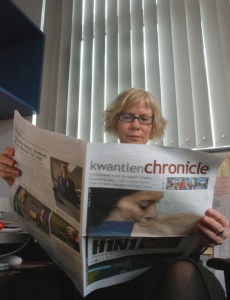Kwantlen’s journalism program on the move to social sciences
October 8, 2009 by Kyle Vinoly

Beverley Sinclair, chair of Kwantlen's Journalism program, soaks in the latest issue of the Chronicle, which as of 2011 will be based in Surrey.
As of Oct. 9, Kwantlen’s Journalism program will become part of the faculty of social sciences, leaving its long-time home in the faculty of design and communications.
“It’s really an administrative change at this point,” said Beverley Sinclair, coordinator of the journalism program. Students can expect to feel the impact of the change in the fall of 2011, when all the journalism courses will likely be moved on Kwantlen’s Surrey campus.
“The faculty of Design and Communications, which is where we have been, has been fine up until now,” said Sinclair. “We are clearly more suited to be with and aligned with [the faculty of social sciences], it’s just a way better fit.”
Sinclair said the idea to switch faculties was first discussed about a year ago.
The hope is that moving from Richmond to Surrey campus will improve access for journalism students to social science courses and vice versa. The areas of study featured in social sciences are anthropology, Asian studies, criminology, geography, history, political science, psychology and sociology.
“We want to make our third- and fourth-year courses, the academic ones, more widely available to students who can benefit from them,” said Sinclair.
Robert Adamoski, chair of the criminology department, sent an email welcoming the journalism department into his faculty. He echoed Sinclair’s hope that the shift will make programs more accessible for students in both faculties and cited the benefit of different perspectives being shared between students.
“It’s clear to me that this is a dynamic period for journalism as a profession and an academic discipline,” wrote Adamoski in the email. “[The]Â Kwantlen faculty have a good sense of the opportunities that a carefully considered, leading-edge BA program will offer.”
Sinclair said that changes will be made to the program in order for it to keep up with what’s happening in the journalism profession. More emphasis will be placed on what’s been called new media and on-line publishing, which doesn’t mean that print or photography will be neglected.
“Being able to write and do great photography and images, that will always be the mainstay of the program,” said Sinclair. “How it’s delivered is changing and so we just continue to change in the program as well.”
The program will also continue to develop strong academic journalism and mass communications studies.



Hopefully this will mean that the darkroom facilities that currently exist on the Surrey campus could be expanded and become larger to accommodate not only the current fine art students that use it but the Journalism students.
Right now, in Surrey, there are only 12 enlargers for 15 students in one class. It would be great for both areas of study, and even for offering expanded continuing education courses, to have a facility that could accommodate up to 30 students at a time, if not more.
The journalism department hasn’t used darkrooms since moving to primarily all digital classrooms and news production about five years ago, so the eventual move to Surrey won’t require any darkroom space for our students.
- Mark Hamilton, Journalism instructor